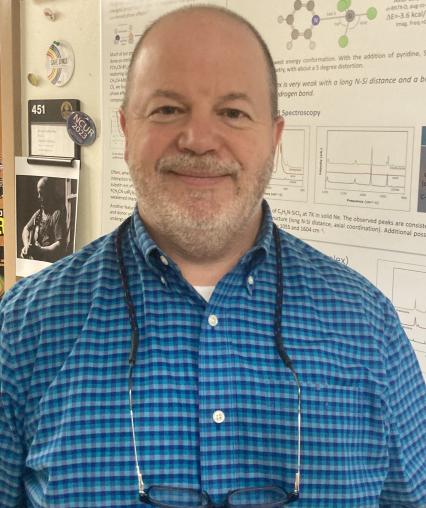
Dr. Jim Phillips
Contact Information
101 Roosevelt Ave
Eau Claire, WI 54701
Available via email.
Biography
Dr. James A. (Jim) Phillips is a Professor in the Department and Chemistry and Biochemistry at the University of Wisconsin - Eau Claire, where he teaches general, physical, and environmental chemistry. There, he has developed several courses covering climate change and other environmental issues from a multidisciplinary perspective, and he also maintains an active, externally funded undergraduate research program. He has won several awards for teaching and mentoring undergraduate research students, including: the Career Teaching Excellence Award from UWEC’s College of Arts and Sciences (2013), the Excellence in Mentoring Research, Scholarship, or Creative Activity Award from the Office of Research and Sponsored Programs at UWEC (2015), and the ChemCUR Outstanding Mentorship Award, form the CUR Chemistry Council (2020). He joined the UWEC faculty in 1998 following a two-year NOAA Postdoctoral Fellowship in Climate and Global Change at University of Colorado-Boulder. Prior to that, Phillips earned a B.A. in Chemistry from Middlebury College (Vermont) in 1991 and returned to his home city for graduate school to ultimately earn a Ph.D. in physical chemistry from the University of Minnesota in 1996.
Education
- Postdoctoral Work: University of Colorado (Physical and Atmospheric Chemistry)
NOAA Postdoctoral Fellowship in Climate and Global Change
Advisor: Dr. Veronica Vaida - Ph.D., University of Minnesota-Twin Cities (Physical Chemistry)
Thesis Advisor: Dr. Kenneth Leopold - B.A., Middlebury College, Middlebury, VT (Chemistry, Music Composition)
Thesis Advisor: Dr. Sunhee Choi
Teaching and Research Interests
- General chemistry: CHEM 115, 106
- Physical chemistry: CHEM 433, CHEM 434, CHEM 438
- Environmental chemistry: CHEM 127, CHEM 304
- Independent study: CHEM 399/497/499
Structural and Energetic Properties of Molecular Complexes: The main interest of the Phillips group is to identify and characterize “molecular complexes”, which are associations of two otherwise stable molecules (or simply, “two molecules stuck together”). We are specifically interested in identifying those that undergo substantial changes in structure in response to a change in their chemical environment (gas phase vs. solution, vs. solid state). One example of this type of behavior is a "gas-solid structure difference"; when a complex has a different structure in its gaseous state than when it exists as bulk material as a solid. Some molecular complexes show extreme sensitivity to their environment, and undergo significant structural changes in solution, or even in solidified inert gases: neon, argon, and nitrogen. The main tools of our research are low-temperature (4-20 K) infrared spectroscopy, which allows us to detect structural changes in inert, bulk, solid samples, and computer models, which enable us to explore gas-phase structures and understand the underlying mechanistic features that lead to this behavior. To date, this research program has been supported by over $1.5 million in external grant funds, and has led to 25 peer-reviewed journal articles (with 58 UWEC student co-authors), and 75 off-campus student conference presentations.
Recent Grants: 15 external grants for a total of over $1.5M in funds for research, in addition to numerous internal grants awarded by UWEC’s Office or Research and Sponsored Programs.
“RUI: Condensed-Phase Effects on the Structural and Energetic Properties of Nitrogen Donor – SOx Complexes”; NSF-RUI-Chemistry, 9/1/22 to 8/30/25, ($313,276).
RUI: Continued Studies of Condensed-Phase Effects on the Structural Properties of Molecular Complexes”; NSF-RUI-Chemistry, NSF-RUI-Chemistry, 9/1/16 - 8/31/22, ($246,592, plus $22,055 in supplemental funds).
Published Research
Principle author of 25 peer-reviewed articles as PI since 1998 (35 in total), with 58 UWEC student co-author citations. (* designates UWEC undergraduate co-authors)
“Matrix Effects on Hydrogen Bonding and Proton Transfer in Fluoropyridine - HCl Complexes”; C. Soares,*, A. R. Ley,* C.B. Zehner,* P.W. Treacy,*, J.A. Phillips Phys. Chem. Chem. Phys. 2022, 24, 2371.
“Structural and Energetic Properties of OC–BX3 Complexes: Unrealized Potential for Bond-Stretch Isomerism”;J.A. Munos*, D. T. Lowney*, J.A. Phillips, Phys. Chem. Chem. Phys. 2021, 23, 14678. (Designated "HOT" Article for 2021.)
“Structural and Energetic Properties of RMX3-NH3 Complexes”, J.A. Phillips, A.R. Ley*, P.W. Treacy*, B.M. Wahl*, B.C. Zehner*, K.J. Donald, and S. Gillespie, Int. J. Quantum Chem. 2020; e26383.
“Modeling Reaction Energies and Exploring Noble Gas Chemistry in the Physical Chemistry Laboratory”, J.A. Phillips, in, “Using Computations to Teach Chemical Concepts”, ACS Monograph Series, ACS Publications, 2019.
Honors And Recognition
2020 ChemCUR Outstanding Mentorship Award, CUR Chemistry Council
2019, 2013, 1999 Voted “Professor of the Year” by UWEC Chemistry Students
2015 Excellence in Mentoring Research, Scholarship, or Creative Activity Award, UWEC
2013 Career Teaching Excellence Award, UWEC College of Arts & Sciences
2004 - 2009 Henry Dreyfus Teacher-Scholar, Camille and Henry Dreyfus Foundation
2004 Technology for Innovation in Education (TIE) Fellowship, UWEC - TLTDC
2003 Outstanding Student Organization Advisor Award Nominee, UWEC
2001 Inducted as Honorary Member of Golden Key Honor Society
1996 - 1998 NOAA Climate and Global Change Postdoctoral Fellowship
1995 Overend Award, Chemistry Department, University of Minnesota
1995 Rao Prize, The Ohio State International Symposium on Molecular Spectroscopy
1991 - 1992 Graduate Fellowship, Chemistry Department, University of Minnesota
1991 Outstanding Senior Chemistry Major Certificate, American Institute of Chemists
1991 Highest Honors thesis designation, Department of Chemistry, Middlebury College